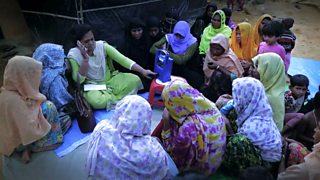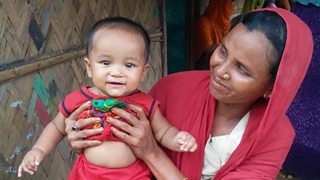Information is aid: empowering Rohingya women in Cox鈥檚 Bazar
Mukta Roy
Humanitarian Officer, 主播大秀 Media Action Bangladesh
Tagged with:
On the first anniversary of the Rohingya crisis, one of our humanitarian workers on the ground in Bangladesh tells how a radio programme helped a mother keep her baby son healthy.
“I have learnt lots of new things from the radio programme, especially when the doctor advised about different health issues and encouraged me to visit nearer health care centres along with my husband when my children got sick.” Saiyada, Kutupalong camp, Bangladesh.
For the last seven months I’ve been working in Cox’s Bazar, Bangladesh, as part of 主播大秀 Media Action’s response to the Rohingya crisis. We help humanitarian organisations better understand the needs of the hundreds of thousands of people currently living in the camps and ensure displaced Rohingya people and the host communities receive the vital, often life-saving, information they need to support themselves and their families.
I have helped set up listener groups especially for women, giving them the chance to listen to, and discuss, some of the most pressing issues affecting their lives right now. As a woman, I am able to enter the homes of Rohingya women on a regular basis to hear their thoughts and concerns first-hand.
I first met 25-year-old Saiyada when I was setting up listener groups in Kutupalong camp. She had fled from Myanmar to Bangladesh with her family in October 2017 when she was three months pregnant.
Since January 2018, a group of around 20 people have been gathering on a weekly basis in front of her makeshift home – some are regulars, and some come and go. At these gatherings, they listen to a podcast produced by 主播大秀 Media Action, comprised of highlights from the radio show Beggunor Lai (For Everyone). The programme is made by the Bangladesh state broadcaster, Bangladesh Betar, with support from 主播大秀 Media Action and UNICEF, and provides refugees and host communities with the vital, sometimes life-saving, information they need to support themselves in day-to-day camp life.

Saiyada started listening to Beggunor Lai inside her home, sometimes joined by her husband. But after a few months, she began hosting the listener groups where fellow women in the camp came together to hear the podcast and discuss the issues raised in the show with each other.
After hearing an episode about health, Saiyada was motivated to visit her nearest health centre with her husband. She had been experiencing difficulties with her pregnancy and the doctor she heard on the programme prompted listeners to seek professional advice. Saiyada was seen quickly by a doctor who helped her with her symptoms, resulting in the healthy arrival of a baby boy – Abdul.
Then in June of this year, Abdul unfortunately fell sick. Her husband took him to the health centre, but returned without a solution. Empowered by advice she received via our podcast, Saiyada convinced her husband that she should accompany him to the health centre and explain the symptoms to the doctor as she had been monitoring her son’s illness closely. The following day, they both returned to see the doctor and Saiyada was able to properly explain the issues herself, resulting in the doctor prescribing appropriate medication and their son quickly recovering.
“Now I am telling my neighbours to listen this radio program – which has opened my eyes”, Saiyada said.

The majority of Rohingya women are typically confined to the home and reliant on male members of the family to access any sort of information, including how and where to access different kinds of aid. This can be particularly difficult for women who unfortunately don’t have male members of family – for instance those who have been widowed or separated from their fathers or brothers. Given that women make up just over half of the population in Cox’s Bazar, this creates a huge information vacuum.
That’s where 主播大秀 Media Action comes in and why listening groups are so important for women like Saiyada.
Information is aid
You may think that the most important types of aid needed by those affected by the Rohingya crisis are food, shelter and water. But timely and reliable information is also crucial so that people can know where and how to access aid in the first place.
Listener groups are a rapidly growing and increasingly relevant and effective mechanism for providing information and advice to displaced Rohingya communities, as well as for collecting views, opinions and feedback to inform the humanitarian response to the crisis.
For Saiyada, the information she received via Beggunor Lai and the listener group both prompted her to take action for her child’s health, but also informed her where she could go and who she could speak to in order to get the help she and her family needed.
Receiving the right information at the right time empowered her in the decision-making process for her family’s wellbeing. I feel proud to play a part in helping to improve the lives of Rohingya women, like Saiyada, by engaging them through our radio programmes and podcasts.
--
Mukta Roy is a Humanitarian Officer in Bangladesh.
Saturday 25th August marks the first anniversary of the start of the Rohingya emergency, which in August 2017 saw an unprecedented number of Rohingya refugees flee from Myanmar’s Rakhine State across the border into neighbouring Bangladesh - specifically in the district of Cox’s Bazar.
主播大秀 Media Action has been at the heart of the response to the Rohingya emergency from the very start, ensuring refugees and host communities have access to vital information and can convey their needs to humanitarian agencies on the ground.
We’ve helped set up and support 233 listener groups currently operating in 12 camps, like the one described by Mukta, and the number is growing rapidly.
主播大秀 Media Action’s support to radio broadcasters in Cox’s Bazar is funded by UNICEF. Our work training and supporting listener groups is funded by IOM, the UK Department for International Development (DFID) and UNICEF.
